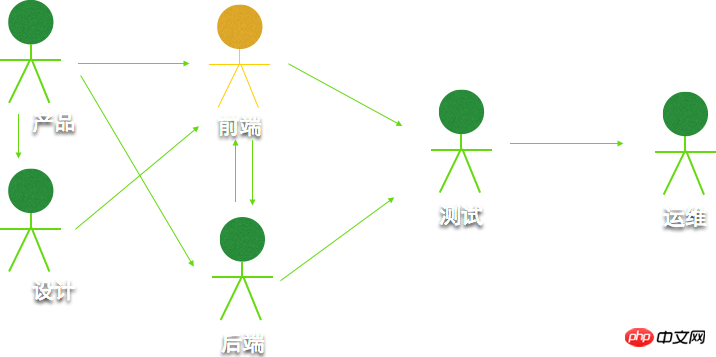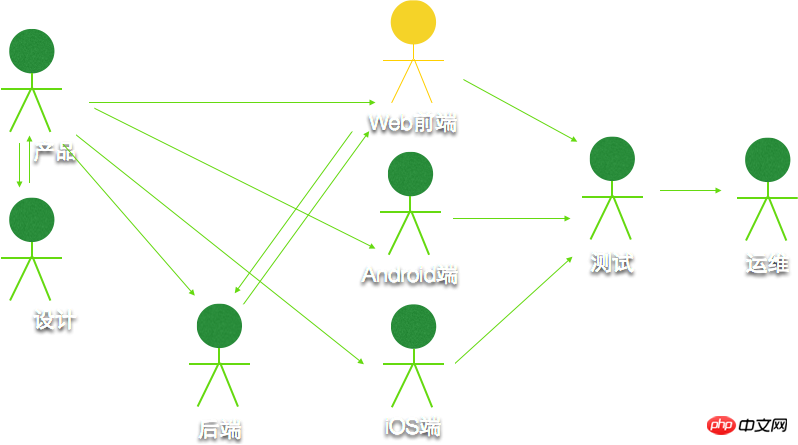What is web front-end development? Prospects for front-end engineers in 2017
What is web front-end development?
Many beginners are still unfamiliar with the WEB front-end and don’t knowWhat is the web front-end? What does the web front end do? AndWhat do you need to learn about web front-end technology? In factWeb front-end development is also jokingly called "web front-end development siege lion", and this position is currently also called "big front-end". Many people don’t know how this position is called, so let me tell you secretly: It was actually the Taobao team who invented the localized name. Due to historical reasons, Taobao rose rapidly after 2005, and the number of visits exploded. The user experience of Taobao has been greatly tested and it is urgent to make progress.
Then Taobao officially had the word [web front-end development] and the recruitment position for the first time. Maybe other websites also thought of such a description, but after all, Taobao, which is well-known, attracts a lot of attention. Naturally, word of mouth spread, and the term front-end development was carried forward.
In the early days, the Web front-end was not called the front-end, but was affectionately called "Web Designer". Yes, you read that right, that's the name. I remember that time [Web Page The saying "Three Musketeers" is flying all over the world. If you master these three bastards, you are really bastard, and you can be called a web designer.
The Three Musketeers of Web Pages (Flash, Dreamweaver, Firewoks) are also known as Macromedia's Three Musketeers of web page production. Since they are products of the same company, they have a very close integration in terms of functionality. Later, after Firewoks was acquired by Adobe, a perverted giant, PS basically replaced Firewoks for web design work. Although I know that some people still use it, it is probably a nostalgia and some useful image cutting functions.
At that time, if web designers wanted to enter this field, they had to master Dreamweaver. It does not mean that he was the only one who could write HTML and CSS, but its automatic prompts were really easy to use at the time. It's so powerful that you can easily accomplish what you want without using any brain cells. In the era when front-end tools and editors were scarce, this was definitely a magical level (of course, after I wrote more, I became familiar with it and basically didn’t need any prompts). There were many tutorials on building websites based on Dreamweaver back then. It was really an era full of gays and lesbians. Friends who are interested can learn about the historical products of these tools.
2005 At that time, most web pages looked like this:

Now web pages generally look like this:

What does a web front-end engineer mainly do? Knowledge and skills required by front-end engineers
Front-end engineers are an indispensable professional R&D role in the development of software products in the Internet era. In a narrow sense, front-end engineers use professional skills and tools such as HTML, CSS, and JavaScript to implement product UI design drafts into website products, covering user PC and mobile web pages, and dealing with visual and interactive issues. Broadly speaking, all parts of user terminal products related to vision and interaction are the professional areas of front-end engineers.
In fact, the core skills of front-end engineers are still: Html, CSS, and JS. In the product development process of a typical Internet company, the relationship between front-end engineers and other roles is roughly like this:

The front-end is the engineer closest to the product and design, and plays a role in connecting products and technology. The front-end is responsible for the parts that users can see, so it is also the engineer closest to the user.
In the era of multi-terminals, if a product supports both PC and mobile terminals, front-end engineers need to deal with more roles:

Front-end requirements Solving interface and interaction problems, in fact, problems at the UI level have always been a difficult problem in software engineering, because the UI is constantly changing. The compatibility of various browser versions, Web standards, mobile devices, and multi-terminal adaptation have given front-end engineers great challenges and also have high requirements on the capabilities of front-end engineers. Many UI problems have more than one solution, and many problems have very clever ideas and wonderful solutions. Front-end is a very creative group among engineers, because this industry requires rich creativity and imagination.
Front-end engineers are also the setters, practitioners and promoters of Web standards, and the current W3C standards are not limited to browsers, but also include various handheld smart devices, vehicle-mounted devices, smart homes, etc. In the future era of the Internet of Everything, front-end engineers will not only be engineers on web pages, but engineers in all fields of human-machine interaction. See:What do you need to learn to become an excellent front-end engineer?
Prospects for front-end engineers in 2017
The front-end in 2017 is not so much more cruel as it is more standardized. In the first two years, various trainings were conducted for several months Newbies who just come out and casually offer tens of thousands, tens of thousands, will be eliminated from the market.
Front-end development tools/compilation tools are gradually taking shape. Although they are not as complete as IDE environments for top-ranked programming languages such as object-c, java, and C+, they are. The concept of engineering modularity has begun to take root in people's hearts. Those who write original HTML CSS Javascript code these days are either small projects or novices. The browser runs the Iron Triangle: css html js. If the existing browsers remain unchanged, these necessary files will be less and less likely to be written directly by engineers in the future. Instead, they will choose a compilation tool. You can write it in your favorite emerging language, and then compile it into an Iron Triangle file that the browser can recognize. Of course, it is not ruled out that the browser can directly run less, scss, ts and other files in the future. This is possible. For details, please refer to: I heard that you want to write front-end in 2017?
The front-end work in 2017 is more challenging and the directions are more diverse. VR and small programs are very popular recently, and a large number of companies are recruiting front-end talents. 2017 will be a year for front-end engineers to show off their skills. Of course, as long as you have good skills, it is normal to earn a monthly salary of tens of thousands!
But technology is only a part of life. I used to be ambitious, but now I keep my head down and write code. Change what can be changed, accept what can not be changed. Life is limited, brothers fight for the day and night. The attitude towards life learning is: neither impatient nor impatient, neither fast nor slow. Persevere and believe in yourself. Don’t seek to change the world, but seek to change your own life. Don’t ask for a flying stride, but ask for one step at a time. Thanks to suffering, it makes us stronger inside. Thanks to setbacks, they make us continue to grow. Thanks to bugs, they make our thinking deeper. Thanks to the front end, he made us believe even more that it takes eighteen kinds of martial arts to hold up a sky.
[Related recommendations]
1. The latest 6 WEB front-end development manuals are recommended for download
2. Ranking of web front-end development tools: 8 recommended html development tools to download
3. Web front-end learning route: Quick introduction to WEB front-end development
4. Web front-end learning route: Can I build a website by just learning CSS+DIV?

Hot AI Tools

Undresser.AI Undress
AI-powered app for creating realistic nude photos

AI Clothes Remover
Online AI tool for removing clothes from photos.

Undress AI Tool
Undress images for free

Clothoff.io
AI clothes remover

AI Hentai Generator
Generate AI Hentai for free.

Hot Article

Hot Tools

Notepad++7.3.1
Easy-to-use and free code editor

SublimeText3 Chinese version
Chinese version, very easy to use

Zend Studio 13.0.1
Powerful PHP integrated development environment

Dreamweaver CS6
Visual web development tools

SublimeText3 Mac version
God-level code editing software (SublimeText3)

Hot Topics
 1384
1384
 52
52
 How high can the ENA currency go? Forecast of future prospects
Jun 06, 2024 pm 02:24 PM
How high can the ENA currency go? Forecast of future prospects
Jun 06, 2024 pm 02:24 PM
Why is everyone optimistic about the market value of ENAENA? EthenaLabs is the fastest growing player in the highly profitable space of stablecoins - as evidenced by the skyrocketing earnings of the likes of Tether and Maker. Now everyone is very optimistic about ENA currency, why? What is the future prospect of ENA currency? What is the future valuation of ENA currency? Below, the editor of this website will give you a detailed introduction to the valuation of ENA currency and why it is viewed by everyone. I hope you like it! EthenaLabs is the fastest growing player in the highly profitable space of stablecoins - as evidenced by the skyrocketing earnings of the likes of Tether and Maker. I am a loyal supporter of non-crypto-backed stablecoins
 What are the prospects of Go language: becoming the future programming trend?
Jan 30, 2024 am 08:04 AM
What are the prospects of Go language: becoming the future programming trend?
Jan 30, 2024 am 08:04 AM
Go language has an eye-catching future: the future programming trend? With the rapid development of technology and the acceleration of global digitalization, programming languages are also constantly evolving and developing. Among them, Go language is considered to be a programming language with great potential and broad prospects. This article will explore the prospects of the Go language from several aspects and why it may become a future programming trend. First of all, the Go language has a concise and powerful syntax. Compared with some traditional programming languages, the syntax design of Go language is more concise and clear, and the code is easier to understand when written.
 What about ABS coins? Is ABS coin worth investing in?
Jul 16, 2024 pm 12:00 PM
What about ABS coins? Is ABS coin worth investing in?
Jul 16, 2024 pm 12:00 PM
The full English name of ABS currency is Autobusd. In fact, the AutoBUSD project is a special project of ABS tokens. It is mainly used on trading platforms. The purpose of this project is to automatically trade gold. The project is not only able to analyze price trends but also read the direction of price trends, helping users to make buy or sell trades and make decisions to close positions in order to take profits or cut them. In addition, all losses in this project are carried out automatically and do not require manual instructions. So what exactly is ABS coin like? Many investors want to know whether ABS coins are worth investing in? Let me tell you about it below. What about ABS coins? According to the editor's investigation, the number of ABS projects listed on exchanges has returned to zero, so it is no longer possible to purchase A
 How much will PEPE coins fly to in 2025? Is there any prospect for PEPE coins in 2025?
Mar 05, 2025 pm 04:12 PM
How much will PEPE coins fly to in 2025? Is there any prospect for PEPE coins in 2025?
Mar 05, 2025 pm 04:12 PM
PEPE Coin: Price forecast and development potential analysis for 2025 and the next decade PEPE Coin, this meme coin based on Ethereum has quickly become the focus of the crypto market with its unique Pepe frog image and skyrocketing price. This article will conduct in-depth analysis of PEPE currency's price forecast in 2025 and look forward to its development potential in the next decade and the key factors affecting its price fluctuations. PEPE Coin Price Forecast in 2025: Many analysts predict that PEPE Coin may reach US$0.00006 in 2025. Although there is room for upward, overall growth is expected to be relatively moderate. This forecast is based on the current price of PEPE currency (USD 0.000017) and its strong performance over the past year. However, cryptocurrency market fluctuations
 Learn C or Python? Which choice is more promising?
Mar 21, 2024 pm 03:45 PM
Learn C or Python? Which choice is more promising?
Mar 21, 2024 pm 03:45 PM
Learn C or Python? Which choice is more promising? In today's era of rapid development of information technology, the choice of programming language has become the focus of many people's attention. Especially in the process of learning programming, many beginners are confused whether to choose to learn C language or Python. So which one is more promising? This article will compare the technical characteristics, application fields and job market, and provide specific code examples to help readers better understand and make decisions. Comparison of technical characteristics of C language: C language is a widely used
 Which self-media platforms have good prospects? What are the self-media platforms for graphics and text?
Mar 27, 2024 pm 01:26 PM
Which self-media platforms have good prospects? What are the self-media platforms for graphics and text?
Mar 27, 2024 pm 01:26 PM
In the digital era, self-media platforms have become an important channel for individuals and enterprises to spread information and shape brand image. With the advancement of technology and the diversification of user needs, more and more self-media platforms have emerged. This article aims to introduce some promising self-media platforms and common graphic and text self-media platforms to help readers understand and use these platforms more comprehensively. 1. Which self-media platforms have good prospects? As a leader in the short video field, Douyin has a huge user base and business potential. Use short videos to attract more users' attention and increase brand awareness and influence. Toutiao, as a news and information platform, brings together a large number of users and rich content. By publishing articles on this platform, you can use its recommendation algorithm to make the content more widely disseminated.
 Golang's prospects in the field of artificial intelligence
Mar 18, 2024 pm 02:39 PM
Golang's prospects in the field of artificial intelligence
Mar 18, 2024 pm 02:39 PM
Title: Golang’s prospects in the field of artificial intelligence. With the rapid development of artificial intelligence technology, more and more languages and frameworks are being used in this field. Go language (Golang) is gradually favored by artificial intelligence developers due to its efficient concurrency features, excellent performance and concise syntax structure. In this article, we will explore Golang’s prospects in the field of artificial intelligence and demonstrate its potential in artificial intelligence applications through specific code examples. 1. Golang’s advantages in the field of artificial intelligence
 What is the future of Golang at Google?
Feb 29, 2024 pm 01:36 PM
What is the future of Golang at Google?
Feb 29, 2024 pm 01:36 PM
What is the future of Golang at Google? Go language, also known as Golang, is a programming language developed by Google. Since its official release in 2007, Golang has been widely used within Google and has begun to receive the attention and love of developers around the world. So, what is the future of Golang at Google? First of all, from the perspective of Google's internal application, the scope of Golang's application in Google is constantly expanding. Many of Google's internal projects and services use G



